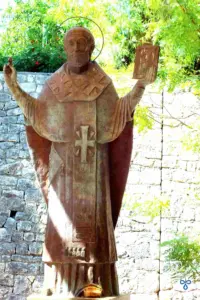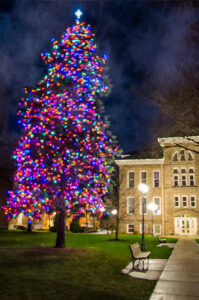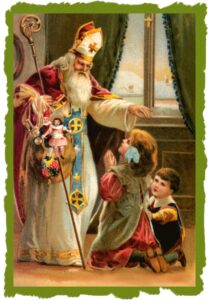As surely you have noticed, most of our American Christmas customs have nothing to do with the Birth of Jesus Christ. They’re secular – that is, without any specific religious connotations. That doesn’t mean they’re evil. Many of them are good or lovely or fun.
But first, there’s one thing about secular Christmas which I no longer love:
A White Christmas. There’s nothing Christian about this. It snows very rarely in Bethlehem. Besides, it’s unlikely that  Jesus was born in the winter. Shepherds would not have had their flocks out in the fields at that time of year. So far as I can discover, our fixation on snow for Christmas goes back no further than the song “I’m Dreaming of a White Christmas”, written in 1942 by Irving Berlin and sung by Bing Crosby. During December our weather forecasters up here in the northern climes are forever calculating whether we’ll have a “white Christmas” or not. This year we almost certainly will not. Our forecast for December 25 is 50 and rainy. Good! At my age, getting to church in the snow is no fun. I am definitely not “dreaming of a white Christmas”.
Jesus was born in the winter. Shepherds would not have had their flocks out in the fields at that time of year. So far as I can discover, our fixation on snow for Christmas goes back no further than the song “I’m Dreaming of a White Christmas”, written in 1942 by Irving Berlin and sung by Bing Crosby. During December our weather forecasters up here in the northern climes are forever calculating whether we’ll have a “white Christmas” or not. This year we almost certainly will not. Our forecast for December 25 is 50 and rainy. Good! At my age, getting to church in the snow is no fun. I am definitely not “dreaming of a white Christmas”.
Also, at Christmastime, there’s something – actually someone – else I don’t love but have made my peace with:
Santa Claus. I’ve run you through the following information before, but for the sake of new readers:
The name “Santa Claus” is an American derivation of Saint Nicholas by means of the Dutch “Sinter Klaas”. (Remember, the Dutch first settled New York City, which they called “New Amsterdam”.) Sinter Klaas was said to visit on Saint Nicholas Day, December 6. Then in the early 1800s an Anglican professor in New York City wrote a poem “‘Twas the Night Before Christmas” in which (for reasons he never explained) he turned Saint Nicholas into a tiny fat Norse elf who arrived on Christmas Eve. How he became full-sized and jolly and started selling merchandise is too much to go into here.

When I was little, Santa Claus was still a mysterious, magical figure who showed up (they said, but I never saw him) only on Christmas Eve – and also in a few department stores.
Today he has been known to arrive, sometimes by helicopter, even before Thanksgiving, accompanied by a woman  also dressed in red. (We assume they’re married, but these days you never know.) No matter, they seem to have been prolific, as you can plainly see here. Santa now sells everything from automobiles to real estate to… … uh, … …don’t look it up. You don’t want to know.
also dressed in red. (We assume they’re married, but these days you never know.) No matter, they seem to have been prolific, as you can plainly see here. Santa now sells everything from automobiles to real estate to… … uh, … …don’t look it up. You don’t want to know.
Today I prefer to think of Santa Claus as Saint Nicholas’ sometimes lovable, sometimes somewhat demented nephew.


In the city of Myra in Turkey, hometown of Saint Nicholas, not long ago they replaced their good statue of Bishop Saint Nicholas with a statue of you-know-who.
I take back what I said. I have not made my peace with modern secular Santa Claus. Parents, your children will believe in Santa Claus. That’s ok, just so long as they don’t confuse this guy with the real Holy Bishop Nicholas. We never told our Jennifer and David that Santa existed. When they began to ask the big question, we responded: “What do you think?” Then as they slowly figured it out, they were proud of themselves for discovering the secret. Then we told them about the real Saint Nicholas.
Forgive me for going off on my annual Santa Claus rant. (Traditions must be upheld!)
However, as for the rest of modern secular Christmas, I think it’s good, even if it could be better:
Christmas cards are a good thing; they keep us in touch with people with whom we might otherwise lose track, even if  sometimes their letters have a touch of braggadocio. * However, notice how many “Christmas” cards these days have gone secular, have nothing to do with Jesus. Why don’t we Christians make a quiet witness and send actual Christmas cards proclaiming the birth of Our Lord Jesus Christ?
sometimes their letters have a touch of braggadocio. * However, notice how many “Christmas” cards these days have gone secular, have nothing to do with Jesus. Why don’t we Christians make a quiet witness and send actual Christmas cards proclaiming the birth of Our Lord Jesus Christ?
- “We spent the summer at our home in the north woods, then wintered in Aruba. Our son has graduated Phi Beta Kappa from MIT. Our daughter is married to the president of a major corporation”, etc. etc. etc.
Exchanging Christmas greetings. It’s always a good thing to be friendly – but this also is going secular. Whether in person or in the media, few people seem to say “Merry Christmas” any more. Now it’s often “Happy Holidays”. I’m sure this is well-intended – so as not to hurt the feelings of those who are not Christians. Good motive, wrong approach. Look: it’s December 25! At other times we should celebrate everybody’s holidays. My favorite pharmacist is a devout Muslim. He wished me “Merry Christmas”. I wished him “A blessed Ramadan and Eid al-Fitr!” We should wish our Jewish brothers and sisters “Happy Hannukah!” All this assumes we will get to know people well enough to know their faith, and that also would be altogether a good thing. Why don’t you make it easy for people: wear some visible sign to show you’re a Christian. (However, I don’t know what to wish atheists and agnostics who have nothing to celebrate. “Happy ____!” How sad.)
“Christmas” trees and decorations.
Our Christmas tree is up, covered with lights – so beautiful. There’s nothing specifically Christian about bringing in and decorating trees at this time of year. They had a pre-Christian European origin – put up at the winter solstice, the darkest time of year, evergreens as a sign of life that winter and darkness cannot destroy. Other Christmas lights and decorations have the same connotation. The evidence that the preceding is not particularly Christian is that it has spread all over the world. Here is Christmas in Japan,  where only about 2% of the population are Christians:
where only about 2% of the population are Christians:

And I can’t resist showing you a picture from our Cedarburg, Wisconsin:

.Giving and receiving gifts at Christmas. I would have made a good hobbit: I love getting presents. However, as I’ve got older, in light of the Lord’s words “It is better to give than to receive” *, I’ve also come love giving presents.
- The only words of Christ not found in the Gospels, but rather quoted by Luke in Acts 20:35.

Exchanging gifts at this time of year also is of pre-Christian origin, done in many places to celebrate the winter solstice and return of the sun. In Rome they celebrated the great “Feast of Sol Invictus”, the “Unconquered Sun”. (Since nobody knows the date of Christ’s birth, Roman Christians apparently adopted -well, “stole” – that date for the Feast of the Nativity of Christ. *) However, in Western Christianity, Saint Nicholas brought gifts, chiefly for children, on his feast day, December 6. In some places, especially among people of Germanic background (here in Milwaukee, for example), he still does. In Eastern Christianity it is Saint Basil who brings gifts on his feast day, January 1 – though I gather Santa Claus is winning the battle with him there, too. The American custom of giving gifts at Christmastime appears to have become generally popular only after the writing of the poem “Twas the Night before Christmas”.
- There are other possible explanations, as well.
Giving to the needy at Christmas is a still better thing, and I hope you do this. At least one of the gifts you should ask for at Christmastime should be not for you but for a charity. Here’s the address for International Orthodox Christian Charities, an extremely efficient and trustworthy organization: https://give.iocc.org/campaign/2023-christmas-gifts-of-love/c533699
Music at Christmas-time also is lovely or cute, most of it. * Here too, we old-timers have noticed a change over the years from Christian to secular. Except in churches the old Christmas carols aren’t heard much any more. I looked up one listing of “Most Popular Christmas Music”; out of twenty songs none were about Jesus. In another listing of about fifty, there were four actual Christmas carols, towards the bottom. Today Christmas music, for the most part, has nothing to do with Christmas.
- I could probably survive without Ruldof the Red-nosed Reindeer. Sorry. Now we’ll be singing it to ourselves the rest of the afternoon. To escape from his spell: Quick! put on some good Christian (preferrably Orthodox) Christmas music.

Family gatherings are great at Christmas-time (so long as we don’t get arguing about politics), but here also there’s nothing specifically Christian about it. All over the world people have gathered to celebrate holidays, including the winter solstice. However, in America, Christmas as a time for families to gather is a relatively modern custom. Did you know: In New England the Puritans forbade the Christmas celebration; it was a workday like every other day. * Where it was celebrated it often became an excuse for rowdy drinking. Family Christmas, as we know it, did not became popular in America till the 19th Century. Congress finally declared Christmas to be an official American holiday in 1870. (I wonder if they could do that today.)
- They came to America because people in England couldn’t put up with them.
All that is why I love modern secular Christmas. I just wish we Christians would make an effort to recover or at least use much of the above for Jesus.
Here might be a possible way for us Orthodox to do so:
Orthodox Christmas Customs
Old country Orthodox, as they have becoming Americanized, are progressively losing their Old Country traditions, which is a real shame. Many of them are deeply rooted in Orthodox Christian culture. I wish Orthodox people would continue them or recover them – and share them with those of us “converts” who have lost most of ours.
 As, over the years, a genuine American Orthodox Church and culture begin to develop, it should not become part of the “melting pot” where all our Orthodox customs are lost in a bland American secular porridge – Santa and Rudolph and “I Saw Mama Kissing Santa Claus” and the like. Rather we should
As, over the years, a genuine American Orthodox Church and culture begin to develop, it should not become part of the “melting pot” where all our Orthodox customs are lost in a bland American secular porridge – Santa and Rudolph and “I Saw Mama Kissing Santa Claus” and the like. Rather we should  have a “stew” with all sorts of distinct textures and flavors – Christmas customs from all over the Orthodox world, so what we can share all these things with each other. * Thereby we can have a genuinely Orthodox Christian Christmas.
have a “stew” with all sorts of distinct textures and flavors – Christmas customs from all over the Orthodox world, so what we can share all these things with each other. * Thereby we can have a genuinely Orthodox Christian Christmas.
- Father John Tsikalas, Pastor of Saint Andrew’s Greek Orthodox Church, South Bend, Indiana, has compiled a fascinating list of genuine Orthodox Christmas customs, well worth reading: https://saintandrewgoc.org/blog/2012/12/13/orthodox-christmas-traditions.html
Now may Christ our Incarnate God grant you and all whom you love a very merry, happy, holy Orthodox Christian Feast of His Nativity.
Next Week: our usual compilation of Orthodox Christmas music.
Week after Next: Hard evidence for the Holy Family’s years as refugees in Egypt
Thank you Father!
May the Lord bless you and the family at Christmas!
Keep up the good work!
Keep posting!
i). In my family we prefer to call the man with the reindeer ’Father Christmas’ rather than SC.
ii). I like this version of the story of St Boniface (aka St Winfrid of Crediton).
As a missionary in Germany in the 8th century he cut down an oak tree sacred to the god Thor. In its place a fir tree grew: a symbol of the victory of Christ over paganism: the Christmas tree!
iii). The story is told of a man who took a case to court accusing the state of discrimination against atheists: other faith positions had a particular holiday but atheists didn’t.
The judge threw out the case: “You have April 1st!” he said!
Psalm 14:1a
https://en.wikipedia.org/wiki/April_Fools'_Day?wprov=sfti1